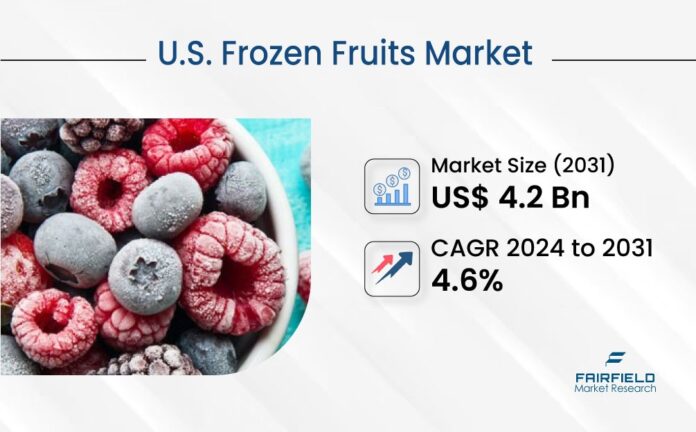Consumers in the U.S. are increasingly seeking healthier alternatives to processed and sugary foods. The demand for frozen fruits has grown substantially as they offer high nutritional value, long shelf life, and ease of consumption. Unlike fresh fruits, which have a limited lifespan and are susceptible to spoilage, frozen fruits retain their essential vitamins, minerals, and antioxidants due to advanced freezing technologies.
The trend toward health-conscious eating is further fueled by the rising prevalence of lifestyle-related diseases such as obesity, diabetes, and cardiovascular disorders. Consumers are incorporating more frozen fruits into their diets in the form of smoothies, desserts, and breakfast bowls. Fairfield Market Research notes that this shift is particularly prominent among millennials and Gen Z consumers, who prioritize convenience and nutrition in their dietary choices.
Innovation Driving Market Growth
Innovation has played a crucial role in the expansion of the U.S. frozen fruits market. Manufacturers are leveraging cutting-edge freezing techniques such as IQF (Individually Quick Frozen) technology to preserve the texture, taste, and nutrients of fruits. This method ensures that each fruit piece is frozen separately, preventing clumping and making them easy to use in various culinary applications.
Additionally, there is an increasing focus on organic and non-GMO frozen fruits. With a heightened awareness of food safety and sustainability, consumers are actively seeking pesticide-free and naturally grown produce. Leading brands are responding by launching certified organic frozen fruit products, catering to the demand for cleaner, more transparent food choices.
Furthermore, innovative packaging solutions are enhancing product appeal. Resealable and recyclable packaging options have gained popularity, aligning with the growing sustainability movement. Brands are also experimenting with mixed fruit blends, tropical fruit medleys, and exotic fruit varieties to attract a wider consumer base.
E-Commerce and Changing Consumer Purchasing Behavior
The digital revolution has significantly impacted the way consumers shop for frozen fruits. Online grocery platforms and direct-to-consumer models have made it easier than ever to access high-quality frozen fruit products. Subscription-based services and doorstep delivery options are gaining traction, enabling consumers to stock up on their favorite fruits without the hassle of frequent store visits.
The market indicates that leading retailers and brands are investing heavily in digital marketing and e-commerce strategies to capture this growing segment. Personalized recommendations, targeted promotions, and loyalty programs are being employed to enhance customer retention and drive sales.
Foodservice Industry Boosting Demand
The foodservice sector, including restaurants, cafes, and smoothie bars, is another major driver of the frozen fruits market. Chefs and food manufacturers prefer frozen fruits due to their consistency, year-round availability, and cost-effectiveness. Smoothies, fruit-based desserts, and yogurt parfaits featuring frozen fruits have become menu staples, further fueling market growth.
As more Americans embrace plant-based and vegan diets, frozen fruits are being incorporated into plant-based milk alternatives, dairy-free desserts, and energy-boosting snacks.
Challenges and Market Constraints
Despite its promising growth, the frozen fruits market faces certain challenges. One of the primary concerns is the fluctuation in raw material prices due to unpredictable weather conditions and supply chain disruptions. Additionally, while frozen fruits offer convenience and longevity, some consumers still perceive them as inferior to fresh produce. Bridging this perception gap through educational marketing and awareness campaigns remains a crucial strategy for market players.
Another challenge is the increasing competition from frozen fruit alternatives, such as freeze-dried and dehydrated fruits. These products also offer extended shelf life but with different textures and applications, potentially diverting some consumer interest away from traditional frozen fruits.
Future Growth Prospects and Market Outlook
Looking ahead, the U.S. frozen fruits market is poised for continued expansion. The growing popularity of plant-based nutrition, functional foods, and clean-label products will further drive demand. Market players are expected to invest in research and development to introduce novel frozen fruit products, including probiotic-infused fruits and superfood blends.
Sustainability initiatives will also shape the market’s future. Companies are likely to adopt eco-friendly packaging solutions and sustainable sourcing practices to meet consumer expectations. The emphasizes that partnerships with local farmers and investments in regenerative agriculture will be key strategies for ensuring long-term industry sustainability.







